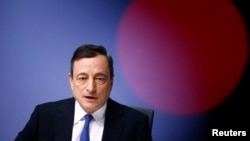The European Central Bank has launched an ambitious stimulus program aimed to stop deflation and boost the ailing, 19-member eurozone. The ECB plans to buy billions of dollars worth of eurozone bonds in the coming months.
More than a year ago, European Central Bank President Mario Draghi said the institution would do "whatever it takes" to preserve the struggling euro currency zone. Thursday, the ECB delivered action.
Draghi said the bank will inject up to $1.3 trillion or more into the eurozone economy, buying up government bonds.
"We believe that the measures taken today will be effective, will raise inflation - medium-term inflation expectations - and basically address the economic situation in the euro area," he said.
The ECB will begin buying nearly $69 billion worth of government bonds each month through September 2016. The measure aims to encourage banks in the eurozone countries to lend more, at lower interest rates. That is expected to push businesses and consumers to borrow and spend more.
The ECB has set a target of a less than two percent inflation rate. That is well above the current level. Last month, eurozone inflation had dipped below zero.
The ECB also said it is cutting the interest rate it charges on loans to commercial banks.
New measures have limits
The bond buying program is known as quantitative easing. The United States and Britain have used this program to recover from the global financial crisis. But Draghi warned the new measures only go so far.
"What monetary policy can do is create the basis for growth. For growth to pick up, you need investment. For investment you need confidence. And for confidence, you need structural reforms. The ECB has taken a further, very expansionary measure today. But now it is up to the governments to implement these structural reforms. And the more they do, the more effective will be our monetary policy."
The ECB action had been widely anticipated, but Thursday's announcement exceeded some expectations and led to mixed reactions.
German opposition
The European action is controversial. The eurozone's biggest economy, Germany, has opposed the bond-buying, voicing fears that the stimulus measure will give the bloc's weakest economies, such as Greece, less incentive to reform their debt-ridden governments.
Speaking before the bank's action, German Chancellor Angela Merkel told the World Economic Forum in Davos, Switzerland that no matter what the bank did, Europe's political leaders "need to put a framework for recovery in place."




